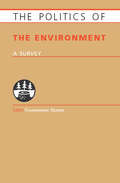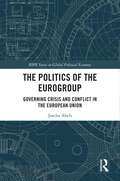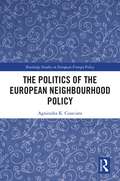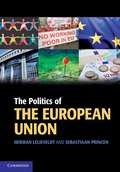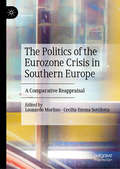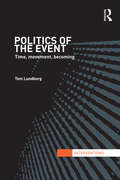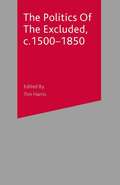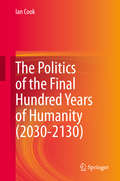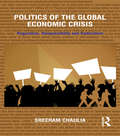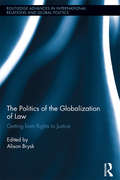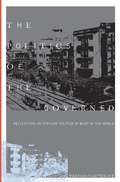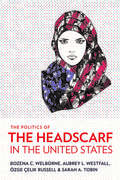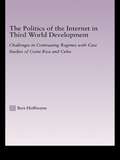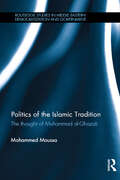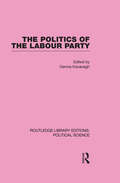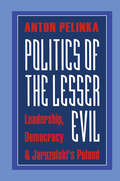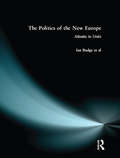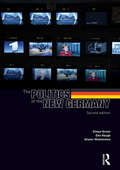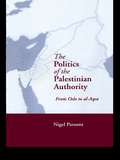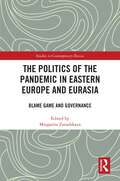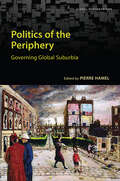- Table View
- List View
Politics of the Environment: A Survey
by Chukwumerije OkerekeThe environment is increasingly seen at the forefront of many political agendas. Covering important topics, such as the Kyoto protocol and deforestation, this book provides extensive coverage of all aspects of environmental politics. Essays of around 6,000 words in length make up the bulk of the book. Written by notable experts in the field of environmental politics, these essays each examine a different aspect of the subject.
The Politics of the Eurogroup: Governing Crisis and Conflict in the European Union (RIPE Series in Global Political Economy)
by Joscha AbelsThe Politics of the Eurogroup provides an intriguing look inside the euro crisis and the secretive forum of finance ministers that came to dominate it. The history of the European Union is a history of crises and the leaps of integration they triggered. As the pandemic, the war in Ukraine, and global power competition are clouding the prospects of the European economies, the member states are looking for solutions. Yet they find their options highly constrained by the economic and political realities created in the decade of the euro crisis. This book fuses a critical political economy perspective on structural relations within the Economic and Monetary Union with a power-based approach to its institutions. It explains why a political project of European austerity emerged from the Eurogroup and side-lined alternative policies, with repercussions still felt today. The author introduces a series of interviews with key decision-makers — ministers, central bankers, EU officials — as well as leaked audio recordings from Eurogroup meetings to give an authentic report of the power struggles between finance ministers. The book retraces how the Eurogroup rose to prominence in the crisis and how a few northern countries — led by the German and Dutch finance ministries — were able to exploit the group’s informal processes to shape the Economic and Monetary Union to their advantage. With its interdisciplinary and investigative approach, this book will be of great interest for scholars and students concerned with European integration, international political economy, economics, institutionalism, and governance. It will also be of value for policy makers in the fields of European politics and economic governance.
The Politics of the European Communist States
by Ghita IonescuThis is a book about the present relations between states and societies in seven countries: Bulgaria, Czechoslovakia, the German Democratic Republic, Poland, Rumania and Yugoslavia.
The Politics of the European Neighbourhood Policy
by Agnieszka K. CianciaraThis book examines the European Neighbourhood Policy (ENP) in the context of internal functions performed with regard to the European Union (EU) political system and its key actors. It argues that the ENP has been formulated not only in reaction to external challenges and threats, but also in response to EU internal legitimacy needs at systemic, institutional and actor level. Looking beyond governance approaches and the power of norms, this book follows a sociological approach to the politics of legitimation. Using Bourdieu's field theory, it bridges the rationalist-constructivist divide inherent in much of ENP scholarship. While analyzing articulations of EU institutions in terms of narrative production, reproduction and reconstruction, it sheds valuable light on where the conflicting goals, ambiguity and incoherence stem from. By highlighting Developing Nations' responses and usages of ENP narratives for domestic and international legitimacy-seeking, the book calls for a more outside-in perspective on EU foreign policy. With the European integration project being increasingly contested, both internally and externally, this book provides a timely focus on the topic of legitimation and delegitimation dynamics with regard to EU foreign policy. This book will be of key interest to scholars and students of European integration and EU foreign policy, and, more broadly, EU Studies and International Relations.
The Politics of the European Union
by Herman Lelieveldt Sebastiaan PrincenA new introduction to the European Union which uses the lens of comparative politics. This approach helps students understand the EU through comparisons with domestic politics and links with broader debates in political science. The text is supported by numerous examples, and chapters include briefings, fact files and controversy boxes which highlight important information and controversial issues in EU politics to widen and deepen student understanding. The authors have developed online 'Navigating the EU' exercises that introduce students to useful sources of information on the internet and help them to analyse policy-making in the EU. This textbook is a comprehensive introduction to EU politics and covers history, theory, key institutions and participants, as well as policies and policy-making.
The Politics of the European Union (Cambridge Textbooks in Comparative Politics)
by Herman Lelieveldt Sebastiaan PrincenThe European Union is a key player in determining policies and politics in Europe, and yet understanding how it works remains a challenge. The Politics of the European Union introduces students to its functioning by showing the similarities and differences between the EU and national political systems. Fully revised and updated in its third edition, this introductory textbook uses the tools of comparative politics to explore the history, theories, institutions, key actors, politics and policy-making of the EU. This comparative approach enables students to apply their knowledge of domestic politics and broader debates in political science to better understand the EU. Numerous real-world examples guide students through the textbook, and chapter briefings, fact files and controversy boxes highlight the important and controversial issues in EU politics. A companion website features free 'Navigating the EU' exercises to guide students in their analysis of EU policy-making.
The Politics of the Eurozone Crisis in Southern Europe: A Comparative Reappraisal
by Leonardo Morlino Cecilia Emma SottilottaThis book provides an in-depth account of the politics of the Eurozone crisis in Italy, Spain, Greece, Portugal, Cyprus and Malta, mapping the positions expressed by the governments of Southern EU countries during the Eurozone crisis negotiations, including Greece’s bailout deal, the so-called “Six Pack” and the “Fiscal Compact” and exploring the process of domestic preference formation. The book relies on original data resulting from fieldwork conducted in the context of the EU Commission- funded Horizon 2020 project “The Choice for Europe since Maastricht”.
Politics of the Event: Time, Movement, Becoming (Interventions)
by Tom LundborgDespite occupying a central role and frequently being used in the study of international politics, the concept of the "event" remains in many ways unchallenged and unexplored. By combining the philosophy of Gilles Deleuze and his concept of the event with the example of 9/11 as an historical event, this book problematises the role and meaning of "events" in international politics. Lundborg seeks to demonstrate how the historical event can be analysed as a practice of inscribing temporal borders and distinctions. Specifically he shows how this practice relies upon an ongoing process of capturing various movements – of thought, sense, experience and becoming. However the book also demonstrates how these same movements express a life and reality that elude complete capture, highlighting the potential for alternative encounters with the event, encounters that constantly threaten to undermine the limits and imaginary completeness of the historical event. This book offers an exciting new way of thinking about the politics of encountering events, arguing that at the heart of such encounters there are always elements of uncertainty and contingency that cannot be fully resolved or fixed. It will be of great interest to students and scholars of international relations, cultural studies and history.
The Politics of the Excluded, c. 1500–1850
by Tim HarrisThis collection of essays seeks to shed light on the politics of those people who are normally thought of as being excluded from the political nation in early modern England. If by political nation we mean those who sat in parliament, the governors of counties and towns, and the enfranchised classes in the constituencies, then the 'excluded' would be those who were neither actively involved in the process of governing nor had any say in choosing those who would rule over them - the bulk of the population at this time. Yet this volume shows that these people were not, in fact, excluded from politics. Not only did the masses possess political opinions which they were capable of articulating in a public forum, but they were alos often active participants in the political process themselves and taken seriously in that capacity by the governmental elite. The various essays deal with topics as wide-ranging as riots, rumours, libels, seditious words, public opinion, the structures of local government, and the gendered dimensions of popular political participation, and cover the period from the eve of the Reformation to the Industrial Revolution. They challenge many existing assumptions concerning the nature and significance of public opinion and politics out-of-doors in the early modern period and show us that the people mattered in politics, and thus why we, as historians, cannot afford to ignore them. Politics was more participatory, in this undemocratic age, than one might have thought. The contributors to this volume show that there was a lively and engaged public sphere throughout this period, from Tudor times to the Georgian era.
The Politics of the Final Hundred Years of Humanity (2030-2130)
by Ian CookThis book is the first book that looks at both the politics of maintaining the trajectory toward humanity’s final hundred years and the politics of those final hundred years. It is the first book to take up theoretical and practical aspects with respect to both the movement toward and events during these final hundred years. As a result, it is the first book that attempts to provide a more complete picture of the politics of catastrophic human-caused environment change.The fact that the book provides a way into the variety of policy problems that catastrophic human-caused environment change is creating means that it is also important to those in Public Policy. The book also raises a series of philosophical and ethical questions associated with human rights, which are significant to those who study Political Philosophy (and some of those who study Law), international action to mitigate the effects of climate change, the nature of science and the limitations of political institutions.
The Politics of the First World War: A Course in Game Theory and International Security
by Scott WolfordThe Great War is an immense, confusing and overwhelming historical conflict - the ideal case study for teaching game theory and international relations. Using thirteen historical puzzles, from the outbreak of the war and the stability of attrition, to unrestricted submarine warfare and American entry into the war, this book provides students with a rigorous yet accessible training in game theory. Each chapter shows, through guided exercises, how game theoretical models can explain otherwise challenging strategic puzzles, shedding light on the role of individual leaders in world politics, cooperation between coalitions partners, the effectiveness of international law, the termination of conflict, and the challenges of making peace. Its analytical history of World War I also surveys cutting edge political science research on international relations and the causes of war. Written by a leading game theorist known for his expertise of the war, this textbook includes useful student features such as chapter key terms, contemporary maps, a timeline of events, a list of key characters and additional end-of-chapter game-theoretic exercises.
Politics of the Global Economic Crisis: Regulation, Responsibility and Radicalism
by Sreeram ChauliaA crucial commentary on the worst global economic crisis since the Great Depression, this book argues for ‘Three Rs’ — Regulation, Responsibility and Radicalism — i.e., state regulation of finance, state responsibility towards society, and radical social movements to fight for economic justice. It will interest scholars and researchers in international political economy, politics, international relations, and economics, as also policymakers and the informed general reader.
The Politics of the Globalization of Law: Getting from Rights to Justice (Routledge Advances in International Relations and Global Politics)
by Alison BryskHow does the globalization of law, the emergence of multiple and shifting venues of legal accountability, enhance or evade the fulfillment of international human rights? Alison Brysk’s edited volume aims to assess the institutional and political factors that determine the influence of the globalization of law on the realization of human rights. The globalization of law has the potential to move the international human rights regime from the generation of norms to the fulfillment of rights, through direct enforcement, reshaping state policy, granting access to civil society, and global governance of transnational forces. In this volume, an international and interdisciplinary team of scholars explores the development of new norms, mechanisms, and practices of international legal accountability for human rights abuse, and tests their power in a series of "hard cases." The studies find that new norms and mechanisms have been surprisingly effective globally, in terms of treaty adherence, international courts, regime change, and even the diffusion of citizenship rights, but this effect is conditioned by regional and domestic structures of influence and access. However, law has a more mixed impact on abuses in Mexico, Israel-Palestine and India. Brysk concludes that the globalization of law is transforming sovereignty and fostering the shift from norms to fulfillment, but that peripheral states and domains often remain beyond the reach of this transformation. Theoretically framed, but comprised of empirical case material, this edited volume will be useful for both graduate students and academics in law, political science, human rights, international relations, global and international studies, and law and society.
The Politics of the Governed: Reflections on Popular Politics in Most of the World (Leonard Hastings Schoff Lectures)
by Partha ChatterjeeOften dismissed as the rumblings of "the street," popular politics is where political modernity is being formed today, according to Partha Chatterjee. The rise of mass politics all over the world in the twentieth century led to the development of new techniques of governing population groups. On the one hand, the idea of popular sovereignty has gained wide acceptance. On the other hand, the proliferation of security and welfare technologies has created modern governmental bodies that administer populations, but do not provide citizens with an arena for democratic deliberation. Under these conditions, democracy is no longer government of, by, and for the people. Rather, it has become a world of power whose startling dimensions and unwritten rules of engagement Chatterjee provocatively lays bare.This book argues that the rise of ethnic or identity politics—particularly in the postcolonial world—is a consequence of new techniques of governmental administration. Using contemporary examples from India, the book examines the different forms taken by the politics of the governed. Many of these operate outside of the traditionally defined arena of civil society and the formal legal institutions of the state. This book considers the global conditions within which such local forms of popular politics have appeared and shows us how both community and global society have been transformed. Chatterjee's analysis explores the strategic as well as the ethical dimensions of the new democratic politics of rights, claims, and entitlements of population groups and permits a new understanding of the dynamics of world politics both before and after the events of September 11, 2001.The Politics of the Governed consists of three essays, originally given as the Leonard Hastings Schoff Lectures at Columbia University in November 2001, and four additional essays that complement and extend the analyses presented there. By combining these essays between the covers of a single volume, Chatterjee has given us a major and urgent work that provides a full perspective on the possibilities and limits of democracy in the postcolonial world.
The Politics of the Headscarf in the United States
by Bozena C. Welborne Aubrey L. Westfall Özge Çelik Russell Sarah A. TobinThe Politics of the Headscarf in the United States investigates the social and political effects of the practice of Muslim-American women wearing the headscarf (hijab) in a non-Muslim state. The authors find the act of head covering is not politically motivated in the US setting, but rather it accentuates and engages Muslim identity in uniquely American ways.Transcending contemporary political debates on the issue of Islamic head covering, The Politics of the Headscarf in the United States addresses concerns beyond the simple, particular phenomenon of wearing the headscarf itself, with the authors confronting broader issues of lasting import. These issues include the questions of safeguarding individual and collective identity in a diverse democracy, exploring the ways in which identities inform and shape political practices, and sourcing the meaning of citizenship and belonging in the United States through the voices of Muslim-American women themselves.The Politics of the Headscarf in the United States superbly melds quantitative data with qualitative assessment, and the authors smoothly integrate the results of nearly two thousand survey responses from Muslim-American women across forty-nine states. Seventy-two in-depth interviews with Muslim women living in the United States bolster the arguments put forward by the authors to provide an incredibly well-rounded approach to this fascinating topic.Ultimately, the authors argue, women's experiences with identity and boundary construction through their head-covering practices carry important political consequences that may well shed light on the future of the United States as a model of democratic pluralism.
The Politics of the Internet in Third World Development: Challenges in Contrasting Regimes with Case Studies of Costa Rica and Cuba
by Bert HoffmannThis book examines the political and developmental implications of the new information and communication technologies (NICT) in the Third World. Whereas the concept of the "digital divide" tends to focus on technological and quantitative indicators, this work stresses the crucial role played by the political regime type, the pursued development model and the specific configuration of actors and decision-making dynamics. Two starkly contrasting Third World countries, state-socialist Cuba and the Latin America's "show-case democracy" Costa Rica, were chosen for two in-depth empirical country studies.
Politics of the Islamic Tradition: The Thought of Muhammad Al-Ghazali (Routledge Studies in Middle Eastern Democratization and Government)
by Mohammed MoussaOver the last two centuries the Muslim world has undergone dramatic transformations, impacting the Islamic tradition and throwing into question our understanding of tradition. The notion of tradition as an unmoving edifice is contradicted by the very process of its transmission, and the complex role human beings play in creating and sustaining traditions is evident in the indigenous mechanisms of change within the Islamic tradition. Politics of the Islamic Tradition locates the work of Egyptian cleric Muhammad al-Ghazali within the context of this dynamic Islamic tradition, with special focus on his political thought. Al-Ghazali inherited a vast and diverse heritage which he managed to reinterpret in a changing world. An innovative exploration of the change and continuity present within Muslim discourses, this book brings together disparate threads of the Islamic tradition, religious exegesis, the contemporary Arab Middle East, the Islamic state and idea of renewal in al-Ghazali’s thought. As well as being one of the first complete treatments of al-Ghazali’s works, this book provides an original critical approach to tradition and its capability for innovation and change, countering the dichotomy between tradition and modernity that typically informs most scholarly studies on contemporary Islam. Offering highly original insights into Islamic thought and engaging with critical notions of tradition, this book is essential reading for students and scholars of Islamic Politics and History.
The Politics of the Labour Party (Routledge Library Editions: Political Science #55)
by Dennis KavanaghIt would be differcult to think of any political party whose internal problems have been so publicly scrutinised as have those of the Labour Party in recent years. The authors of The Politics of the Labour Party were not specifically asked to consider the question-why Labour? There has been no shortage of published views on that subject. Instead they were invited to look at certain themes and topics of longer-term significance. With a focus on contemporary problems, whose consequences are still unfolding The Politics of the Labour Party promotes an understanding of the context in which those problems occured and will develop with its main theme being change. Chapters included focus on power in party; the developing incompatibility of intra-party democracy and parliamentary democracy and the changing styles of political leadership. Noted contributors such as the late Robert Mackenzie, Colin Crouch and Dennis Kavanagh raise important questions about the changes in the relationship between the party and the trade unions; remind us about the scale of labours recent decline in electoral support and investigate the party's ideas of representation and asks if Labour is still the workers party. The Politics of the Labour Party provides simply the most authoritative analysis of the longer-term tensions which lie behind the immediacy of day-to-day events.
Politics of the Lesser Evil
by Anton PelinkaIn his pathbreaking book, Leadership, James MacGregor Burns defines a kind of leadership with an indistinguishable personal impact on society. He calls this "transformal" leadership, and sees it as more than routine and calculable responses to demands. In fact, he argues, the more stable a liberal democracy, the less freedom of action for transformal leadership. Anton Pelinka uses a wellspring of historical fact to argue that politics always means having to choose between the lesser of two evils and that democracy reduces any possibility of personal leadership.According to Pelinka, Jaruzelski's politics of democratization in Poland in the 1980s (which led to the first free and competitive elections in a communist system) illustrate personal leadership hampered by democracy. Jaruzelski initiated the roundtable process that transformed Poland into a democracy; yet, this process ultimately ended with his abdication. Pelinka further emphasizes contradictions between transformal leadership and democracy by comparing the leadership styles of Hitler, Stalin, and Mao. He de-.scribes collaboration, resistance, and tensions between domestic and international leadership, using the American examples of Presidents Wilson, Roosevelt, Kennedy, Johnson, and Nixon and the European examples of Petain and Churchill. Pelinka then turns to the tragic fate of the Judenrate under the Nazi regime to illustrate the "lesser-evil" approach. He closes with a discussion of "moral leadership" and how abstaining from office, just as Gandhi and King did, may be particularly suited to stable democracies.Pelinka's unique use of rich empirical evidence from twentieth-century history is this volume's hallmark. He is critical of mainstream political theory and its neglect of deviant examples of democracies - such as Switzerland, Italy, and Japan, where there is traditionally much less emphasis placed on leadership. Pelinka's noteworthy study will be essential reading for political scientists and theorists, political philosophers and political sociologists with special interest in political ethics, and contemporary historians.
The Politics of the Near: On the Edges of Protest in South Africa (Thinking from Elsewhere)
by Jérôme TournadreThe Politics of the Near offers a novel approach to social unrest in post-apartheid South Africa. Keeping the noise of demonstrations, barricades, and clashes with the police at a distance, this ethnography of a poor people’s movement traces individual commitments and the mainsprings of mobilization in the ordinary social and intimate life of activists, their relatives, and other township residents.Tournadre’s approach picks up on aspects of activists lives that are often neglected in the study of social movements that help us better understand the dynamics of protest and the attachment of activists to their organization and its cause. What Tournadre calls a “politics of the near” takes shape, through sometimes innocuous actions and beyond the separation between public and domestic spheres.By mapping the daily life of Black and low-income neighborhoods and the intimate domain where expectations and disappointments surface, The Politics of the Near offers a different perspective on the “rainbow nation”—a perspective more sensitive to the fact that, three decades after the end of apartheid, poverty and race are still as tightly interwoven as ever.
The Politics of the New Europe: Atlantic to Urals
by Kenneth Newton Ian BudgeA pioneering textbook which explains the dynamics of politics across Europe in the post-Cold war era. Comparing democratisation, transition to a market economy and increasing economic and political integration in the countries of central and eastern Europe with experiences in Scandinavia, and southern and western Europe, the book provides a wealth of information and analysis on the state of Europe at the end of a momentous century of European and World history.
The Politics of the New Germany
by Simon GreenThe Politics of the New Germany continues to provide the most comprehensive, authoritative and up-to-date textbook on contemporary German Politics. The text takes a new approach to understanding politics in the post-unification Federal Republic. Assuming only elementary knowledge, it focuses on a series of the most important debates and issues in Germany today with the aim of helping students understand both the workings of the country's key institutions and some of the most important policy challenges facing German politicians. For this second edition, the content has been comprehensively updated throughout, augmented by additional factboxes and data, and features new material on: Grand coalition Lisbon treaty Constitutional court Financial crisis Reform of social policy Afghanistan. Written in a straightforward style by three experts, each of the chapters draws on a rich variety of real-world examples. In doing so, it highlights both the challenges and opportunities facing policy-makers in such areas as foreign affairs, economic policy, immigration, identity politics and institutional reform. The book also takes a bird’s-eye view of the big debates that have defined German politics over time, regardless of which political parties happened to be in power. It pinpoints three key themes that have characterised German politics over the last sixty years; reconciliation, consensus and transformation. The book is a comprehensive, yet highly accessible, overview of politics in 21st Century Germany and should be essential reading for students of politics and international relations, as well as of European and German studies.
The Politics of the Palestinian Authority: From Oslo to Al-Aqsa
by Nigel ParsonsThis book explores the development of the Palestinian Liberation Organization (PLO) from a liberation movement to a national authority, the Palestinian National Authority (PNA). Based on intensive fieldwork in the West Bank, Gaza and Cairo, Nigel Parsons analyzes Palestinian internal politics and their institutional-building by looking at the development of the PLO. Drawing on interviews with leading figures in the PLO and the Palestinian Authority, delegates to the negotiations with Israel, and the Palestinian political opposition, it is a timely account of the Israel/Palestine conflict from a Palestinian political perspective.
The Politics of the Pandemic in Eastern Europe and Eurasia: Blame Game and Governance (Studies in Contemporary Russia)
by Margarita ZavadskayaThis book provides a comprehensive overview of the political impact of the COVID-19 emergency in central and eastern Europe and Eurasia. Offering a theoretical framework linking the authoritarian, post-Soviet institutional legacy with patterns of political behavior, support and governments’ policies, the expert contributors argue that domestic political regimes mediate and shape citizens’ perceptions of public health crises, and the very regimes’ political survival. The authors explore how the pandemic affected regime change, government stability, business groups and civil societies in more than 15 countries of the region from the discovery of the virus to the vaccination rollout. The studies rely on a broad range of empirical evidence from the region – survey, state statistics, ethnography and interviews. Formulating, explaining and empirically testing the causal mechanisms that drive political accountability and support through a cross-country comparison and in-depth case studies of popular and electoral support attempting to highlight any patterns specific to the region, this book contributes to studies of governance and political accountability in low-trust countries with authoritarian legacies and proclivities. Drawing on an interdisciplinary approach that brings together area studies, history, sociology and political science, it will also be of value to those interested in systematic effect of political regimes on handling public health crises.
Politics of the Periphery: Governing Global Suburbia (Global Suburbanisms)
by Pierre HamelNew urban forms characterizing contemporary metropolises reflect a certain continuity with the patterns of the past. They also include unexpected forms of settlement and design that have emerged in response to social and economic needs and as a way of leveraging new technologies. Politics of the Periphery sets out to explore sub/urban governance in diverse contexts in order to better understand how materiality and space are shaped by the possibilities and constraints of confronting actors. This collection, edited by Pierre Hamel, examines the empirical aspects of collective action and planning in eight urban regions around the world – across North America, Europe, Asia, and Africa – and reveals the impacts and consequences of various structures of suburban governance. The case studies feature a diverse range of local actors facing both the specificity of their respective milieus and the broader context of extended urbanization as metropolitan regions cope with new territorial challenges. The book focuses on suburbanization processes that characterize most of these post-metropolitan regions and questions whether it is possible to improve suburban governance in the face of growing uncertainties arising from structural and subjective transformations. Paying close attention to the relationship between the local and the global, Politics of the Periphery challenges the planning processes of evolving metropolitan regions.
